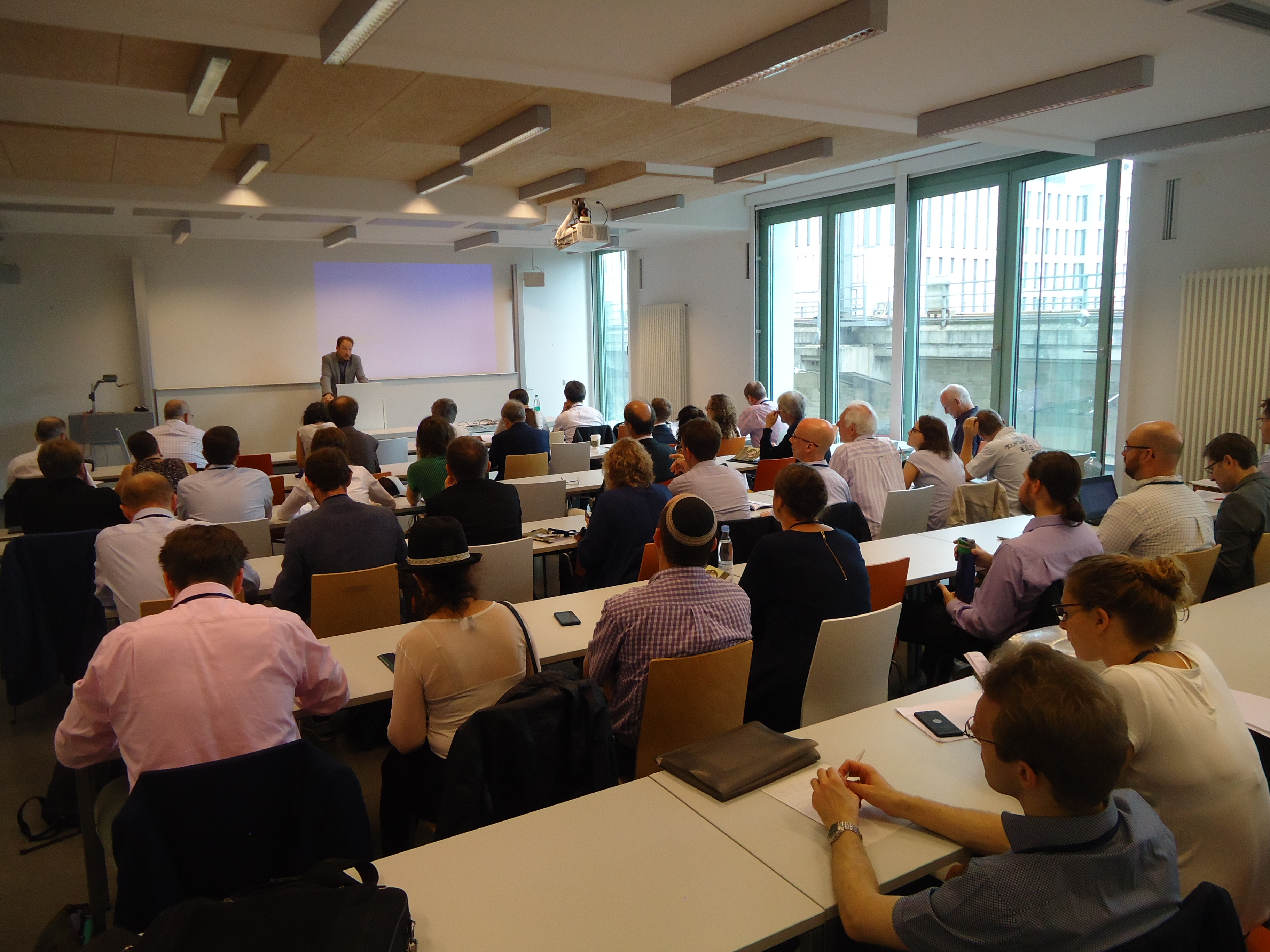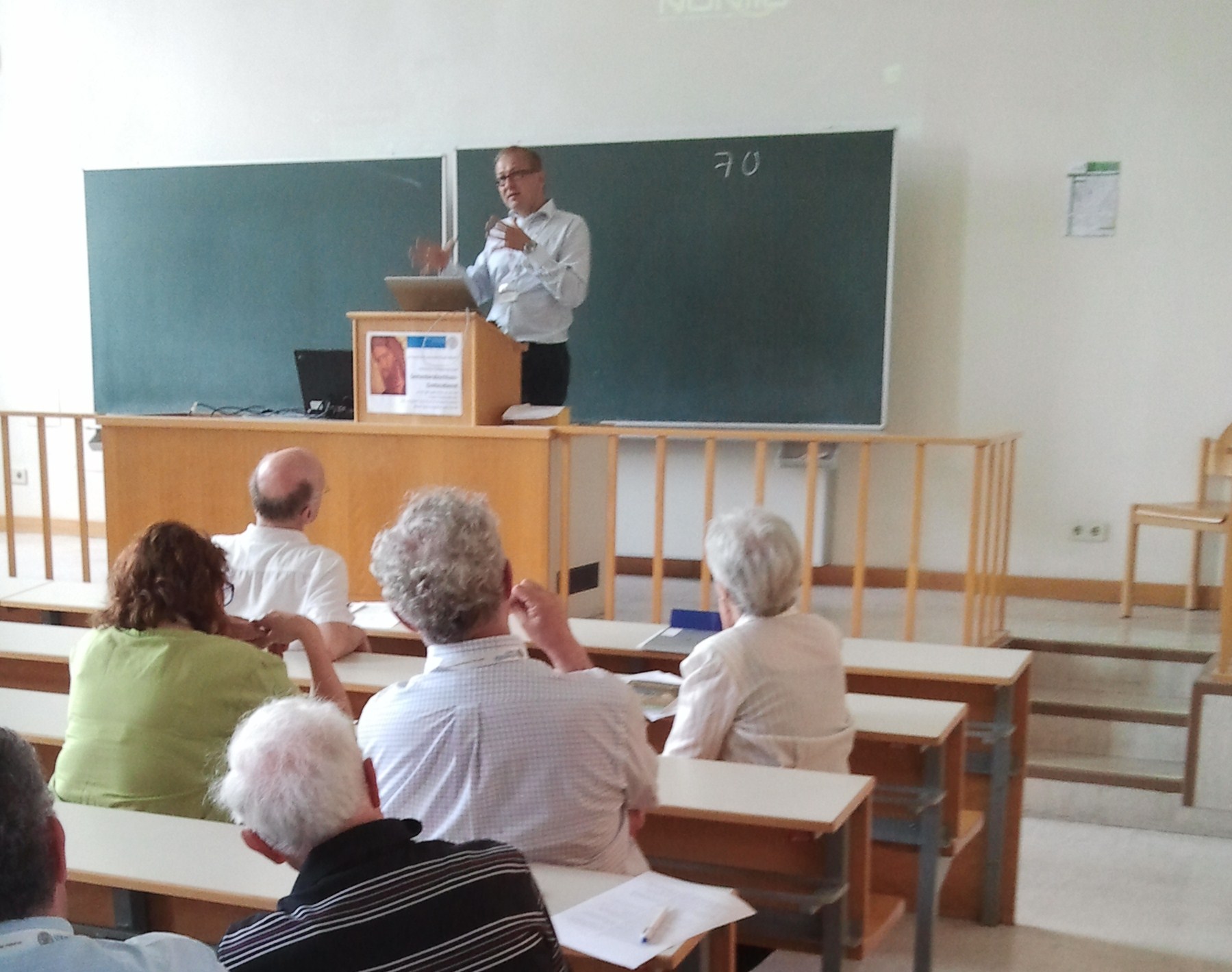Past Meetings
Berlin 2017: Deuteronomistic Histories in and beyond the Former Prophets

At the 2017 meeting in Berlin, the EABS research group “Law and Narrative” hosted a session of invited papers on “Deuteronomistic Histories in and beyond the Former Prophets”. Our intention was to explore the strikingly inconsistent application of Deuteronomy’s laws in Josh – 2 Kgs in contrast to later compositions like Chronicles or the Temple Scroll, which place much more emphasis on the legal material from Deut (and beyond). By comparing the different compositions, we hoped to gain new insights into the compositional history of ‘biblical’ and early Jewish literature and the development of deuteronomistic historical thinking.
- Reinhard G. Kratz, Georg-August-Universität Göttingen:
The Historicisation of the Law in the Book of Deuteronomy and the Hypothesis of the Deuteronomistic History
- Johannes Unsok Ro, International Christian University:
Deuteronomistic History Or Deuteronomistic Histories?
- Kristin Weingart, Eberhard Karls Universität Tübingen:
Does Chronology Offer Insights into Literary History? The Case of the Deuteronomistic History
- Stephen Germany, Independent Researcher:
The Reception of the Laws of Deuteronomy in the Book of Judges
- Manuel Schäfer, University of Erlangen:
Israel Breaking Bad: The Origins of Evil in the Book of Judges
We furthermore hosted an open session.
- Bronson Brown-deVost, Georg-August-Universität Göttingen:
In and Between the Lines of 1 Sam 2:11–18
- Ann-Kathrin Knittel, Ruprecht-Karls-Universität Heidelberg:
Looking for Cult Centralization in Josh to 2 Sam
- Wolfgang Schütte, Independent Researcher:
Tora/Nomos/Lex in 1Samuel – 2Kings Text Tradition
- Andrew Taehang Ohm, Bible Baptist Theological Seminary:
Was the prophet Huldah a Liar?
Leuven 2016: Legal Aspects in the Composition of Biblical Narratives
- Ville Mäkipelto:
Legal Issues Related to the Proto-MT Rewriting of Joshua's Circumcision
- Lars Maskow:
Chronicle’s Reception of Deuteronomic Legislation in the Jehoshaphat Narrative
- Hanna Tervanotko:
Casting of Lots, Looking at Stars: Jewish Divination in the Second Temple Era
- Ayelet Seidler:
The law of Levirate Marriage in Deuteronomy (Deut 25:5-10) and its Relation to the Story of Judah and Tamar (Gen 38)
Cordoba 2015: Violations of Deuteronomy’s Laws in the Former Prophets
At the 2015 meeting in Cordoba, the EABS research group Law and Narrative hosted two sessions of invited speakers on the theme “
Violations of Deuteronomy’s Laws in the Former Prophets.” The topic was approached from two main perspectives: while some papers focussed on passages where disobedience against the law is openly referred to (
1. Explicit violations of Deuteronomy as expression of the author’s ideological agenda), others dealt with narratives describing actions that would seem unlawful from the perspective of Deuteronomy but, interestingly, are not marked as such (
2. Implicit violations of Deuteronomy, resulting perhaps from the adaptation of source material, the author’s ignorance of certain laws …). By applying this twofold approach, we seeked to arrive at a more precise understanding of
which of Deuteronomy’s laws are referred to in the Former Prophets (and which are not!) and
where they are referred to. This approach, in turn, should provide new insights into the disputed redaction history of the so-called Deuteronomistic History.
- Christian Frevel:
Any link? Murder, Blood Revenge and Asylum in Deuteronomy and the Former Prophets
- Pekka Pitkänen:
P/H and D in Joshua 22:9-34
- Edgar Kellenberger:
The Silent Moses in Leviticus 10:16-20
- Sarah Schulz:
“They set up for themselves Micah’s ‚pesel‘ which he made.” Violations of Deuteronomy’s law in Judg 17f.
- Hannes Bezzel:
Saul and the Law
- Reinhard Müller:
Solomon’s wives in light of Deut 7:2-4 and related Deuteronomistic passages
- Raymond F. Person:
The Finding of the Book in 2 Kings 22-23: Refining a Common Understanding Based on Recent Studies concerning Memory
- Louis Jonker:
What was considered to be apostasy by the Chronicler, and how does it relate to Deuteronomic law?
- Christophe Nihan:
Deuteronomic Alignment in Chronicles’ Rewriting of Samuel-Kings: How and Why?
Vienna 2014: Sabbath and Festivals in Law and Narrative

At the joint ISBL/EABS meeting in Vienna our research group conducted two sessions devoted to “
Sabbath and Festivals in Law and Narrative.” We dealt with the narrative contextualisation of the respective legal prescriptions as well as their impact on Biblical and ancient Jewish narratives.
- Karl William Weyde:
Festival Calendars in the Hebrew Bible (Exodus 23; Deuteronomy 16; Leviticus 23) and Their Relation to the Narrative Context
- Dominik Markl:
Liturgical Teaching and Reader-Oriented Rhetoric in Deuteronomy
- Juha Pakkala:
The Reception of the Pentateuchal Festival Laws in Ezra and Nehemiah 8
- Joshua E. Williams:
Oral and Literary Aspects in the Chronicles Account of Josiah’s Passover
- Ida Fröhlich:
The Etiological Foundation of Passover and Massot in the Book of Jubilees
- Shani Tzoref:
A Literary Fugue in Leviticus 25–27: Sabbaths, Servitude, Covenant, and Redemption
- Christian Frevel:
The Postponed Pesach and the Wood-Gatherer: Aspects of Legal Hermeneutics and Literary History in Num 9:1-14 and 15:31-36
- Francis Borchardt:
Sabbath Observance, Sabbath Innovation: The Hasmoneans and Their Legacy as Interpreters of the Law
- Harald Samuel:
Non-Pentateuchal Judaism and Its Festivals
Leipzig 2013: The Reception of Biblical War Legislation in Narrative Contexts
At the EABS conference in Leipzig our research conducted two sessions devoted to “
The Reception of Biblical War Legislation in Narrative Contexts”.
Altogether, we had eight invited papers covering central aspects of the topic both in the Hebrew Bible and in Ancient Jewish literature:
- Reinhard G. Kratz:
Law and Narrative in the Hebrew Bible and the Temple Scroll
- Christoph Berner:
The Wars of the Patriarchs in the Books of Genesis and Jubilees
- Wolfgang Oswald:
Defeating Amalek, Defending the Constitution. The Political Theory of Ex 17:8-16
- Reinhard Achenbach:
Das Banngebot in Dtn 7 und seine Auslegungsgeschichte im Rahmen der Entwicklung des Kriegsrechts
- Cynthia Edenburg:
Paradigm, Illustrative Narrative or Midrash: the Case of Josh 7-8 and Deuteronomic/istic Law
- Harald Samuel:
Deuteronomic War Prescriptions and Deuteronomistic Wars
- Francis Borchardt:
The Battle of Emmaus and 1 Maccabees' Creative Use of Martial Law
- Annette Steudel:
Biblical War Legislation in the War Scroll